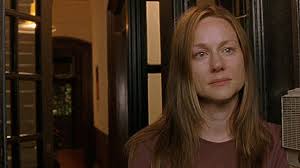
The Squid and the Whale
As reported by Dollyforme
I found this movie in the clearance section of half price books. And I liked it. A great movie released in 2005. It stars the very lovely Laura Linney and she looks wonderful in this movie. I have long been resistant to movies about overly self-absorbed characters wallowing in their own self-imposed problems, which unfortunately tends to be a staple narrative device in indie and art film circles, so you can only image how surprised I was that I enjoyed Noah Baumbach’s The Squid and the Whale as much as I did.
Set in New York City in the mid-1980s, it follows the breakdown of a marriage between Bernard (Jeff Daniels), a college professor and novelist whose star has fallen in recent years, and Joan (Laura Linney), a writer whose star is on the rise. The story is told largely from the perspective of their two children, teenage Walt (Jesse Eisenberg) and preteen Frank (Owen Kline), who are grappling with their own growing pains while also trying to navigate the unchartered waters of their family’s demise, which happens early in the film. In fact, the familial lines are readily apparent in the opening sequence, which finds the family playing a tennis match, each moment of which highlights the simmering tensions that will soon erupt.
Once separated, Bernard moves out of their tony, book-lined brownstone in Brooklyn’s Park Slope neighborhood and into a much shabbier place in the less desirable Ditmas Park, which visually reflects his personal and professional unraveling. They decide on joint custody, which seems like the best option until Walt and Frank realize that it entails their constantly being on the move, shuffling between homes and finding themselves used as collateral in their parents’ various debates.
The split also unearths all manner of dirty laundry that had previously been hidden, especially Joan’s long history of infidelity, which pushes the kids to take sides, with Walt defending his father and Frank leaning more toward his mother. As is often the case, the split also brings out the worst in everyone, as Bernard retreats deeper and deeper into his own pedantic myopia (he is given to referring to beloved books as “minor” works, an irritating practice of casual superiority that Walt attempts to emulate) and starts up an untoward relationship with a sexually aggressive undergraduate student (Anna Paquin) who moves in with him.
Joan, on the other hand, feeling newly empowered by both her independence from Bernard and her rising literary career, becomes more and more self-absorbed, with less attention paid to her children and more to her various boyfriends, including the tennis pro (William Baldwin) that Walt wants to emulate, much to Bernard’s distress (he doesn’t see playing tennis as a “serious” career).
Writer/director Noah Baumbach, who followed his imminently quotable debut Kicking and Screaming (1995) with two rarely seen lesser efforts in 1997, Mr. Jealousy and Highball (the latter of which doesn’t even bear his name), has a gift for writing dialogue and amping up interpersonal tensions in a way that is both dramatically effective and blackly comical; it is this balancing act that elevates The Squid and the Whale above overly self-serious examinations of miserable people from the same era, particularly Mike Nichols’s excruciatingly myopic Closer (2004) and Todd Field’s overly obvious Little Children (2006). Working with cinematographer Robert Yeoman (a regular collaborator with Wes Anderson, who co-produced), Baumbach shot the entire film handheld with Super 16mm, which gives it a slightly documentary-like vibe that feels natural, rather than self-conscious. One of the best things one could say about the film’s deliberate low-budget style is that it amplifies the emotional undertones without drawing undue attention to the technique.
The Squid and the Whale is, in many ways, a dark comedy of embarrassment, with each of the four main characters struggling to find some sense of self outside their fractured family situation (it is, in a sense, like Kicking and Screaming about the pains of growing up). Both Bernard and Joan revert to a kind of juvenile self-absorption, while Walt experiments with forced maturity via his relationship with a sweet-nature girl named Sophie (Halley Feiffer) who often bears the brunt of the narcissistic superiority inherited from his father and Frank sinks into dangerous, self-destructive behaviors like drinking his parents’ alcohol and masturbating in school.
There is a lot of awkwardness, some genuine sadness, some tension-relieving humor, and just enough suggestion of potential growth to avoid either an overly dark ending or a phony feel-good one. Worth a rental – two very big thumbs up!



